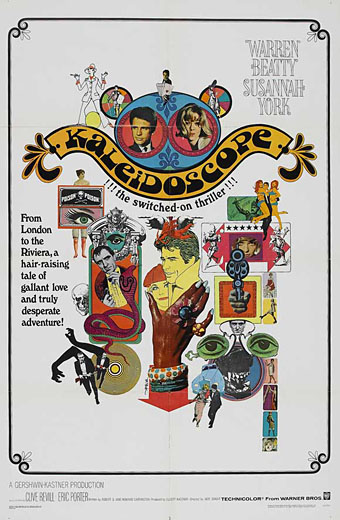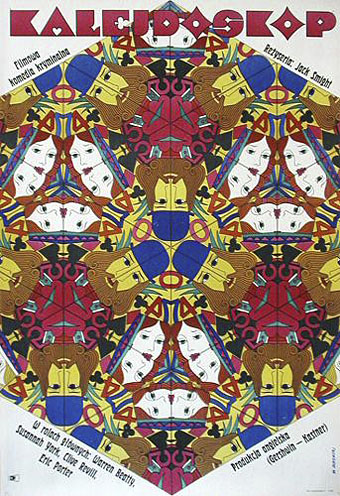I’ve not seen Jack Smight’s 1966 caper movie for years, and don’t remember much about it beyond Maurice Binder’s kaleidoscopic title sequence. But I like this collage poster, a suitably frenetic piece for one of Hollywood’s many attempts throughout the 1960s to capitalise on modish fashion. I can’t find a credit for the designer so if anyone knows who was responsible, please leave a comment.
This Polish poster, on the other hand, is the work of Witold Janowski who successfully combines the film’s title with its playing card theme. Too arty and cerebral for Hollywood (No girls!…no guns!) but that’s how it is with all those great Polish poster artists.
Update: the US poster was by the great Bob Peak.
Previously on { feuilleton }
• The Robing of The Birds
• Franciszek Starowieyski, 1930–2009
• Dallamano’s Dorian Gray
• Czech film posters
• The poster art of Richard Amsel
• Bollywood posters
• Lussuria, Invidia, Superbia
• The poster art of Bob Peak
• A premonition of Premonition
• Metropolis posters
• Film noir posters



Yes, at a certain point, I really don’t know when, maybe beginning in the late fifties and becoming noticeable in the early sixties, Hollywood began to become less interested in art itself and more so in purely monetary gain- and I say why? For years moral decadence and excessive self-indulgence had walked hand-in-hand with well-received high art in Hollywood, hell, ancient cultures as well as men like Baudelaire, Burroughs, Poe, Mishima, and the like all but proved that high art especially at its pinnacle, is inseparable from madness and decadence.
Hell I remember even a silly old flick like ‘King Kong’ being preceded in the intro with an old Arabian saying which, though in a more elegant manner than my remembering, basically stated something to the effect of ‘ -then the wrathful beast beheld beauty, and from thence was a slave and could vent it’s rage freely no more.’ Nowadays, one couldn’t introduce any proposed blockbuster with a thoughtful historic quote without making these 21st Century imbeciles scratch their heads and get frustrated. You know, I am starting to think that evolution may be a pendulum that, years ago got a bit too greedy, and now it has no choice but to swing back in reverse.
Now granted, I hold giant apes to be the stupidest monsters created for popular culture for many reasons, though one may be that they are not truly fictional, as I attended a high school alongside a majority of giant apes. Yes they were quite stupid, half of them wore their dirty jerseys and pads to class, and yes they could be real monsters to many of the not so cool kids. Fortunately for me, most of them were afraid of me so I could be as uncool as I pleased, but now I am just bragging.
The point being, a dumb movie from that era was far more sophisticated, multi-faceted, unpredictable, and challenging than one that is ‘supposedly’ smart today like the hyped up drivel that was Donnie Darko. Yes, I agree motion pictures should aim to be entertaining, but all ‘that’ takes place within the brain anyway, the very place that causes any part your body to feel excitement period, and I am not seeing a hell of a lot of brain activity going on in mainstream cinema anymore.
‘Dark Knight’ was the last really big budget piece that was more than worth the FORTY MINUTES OF FUCKING PREVIEWS that one has to sit through before needing to wake back up to see the movie. Now I think Mr. Ledger’s role in that film was one most oscar-deserving one’s a man could see, and this is coming from someone who likes the Joker so much that I’ve actually had dreams about him. No, not the kind you might be thinking of. However as far as dark, criminal themed movies are concerned, ‘The Dark Knight’ is still nothing compared to the far more subtly crafted and yet all the more intense films of its kind being made by large producers into the early nineties, the last great one of them being ‘Se7en’ in my opinion (though DK probably wins out as my favorite comic book movie, certainly ‘way’ better than the many Alan Moore adaptations, but I don’t think I need to push the point here).
Se7en makes most pussies more psychologically and morally upset, and renders me more giddy, than these sloppy and mindless at best -torture porn- movies that are so popular today, do. Few people know why, and therein lay one of the many beauties about it. Does one really need everything explained to them when instead they could find joy and intellectual fulfillment at the same time?
This is just as true with your movies posters, but now its worse. I have several books of old movies posters and it is incredible how much symbolism / surrealism is in there. Aspects of the poster turn one on while other aspects make their skin crawl and you’re not even quite sure which aspects are doing which but this is fine because not only can you not take your eyes off of it, but you are being stimulated on as many levels of your being that have any awareness at all, as opposed to interacting with the poster or the movie as though you were just getting a hand job or something along those lines, and a lame one, from an ugly girl, or guy for that matter.
I read a more recent interview with Lynch, for all I remember, probably linked from this site. I do remember him saying how impossibly frustrating it is, finding an adequate producer that isn’t so superficial that they basically want to castrate the film and paint it a different color so that jocks and senile senior citizens can follow it, maximizing profit. . . and nothing else. In the same interview he said very bluntly that he regarded film as a dying medium. I have been agreeing with this sentiment more and more over the past several years.
I am not saying go out and become a gamer, I am just saying that idiots like Roger Ebert are wrong; there are some very sophisticated artists – young and old- in Japan, in France and Poland, hell even a few here in the states who work for large game producers, and their output is far more developed as far as story, aesthetics, atmosphere, music, pacing, style, well everything is concerned, than anything Hollywood could churn out of its used-up ass.
When a medium ceases to move because it has propped itself up on too many crutches to support its overfed girth, most the imaginative and inspired are more than ready to move on to other things.
I am spent.
I like this …:)
Hi Pignouf. Some nice works on your blog also.
Wiley: if you look at Hollywood history there was money-chasing right from the outset but it’s true there’s a difference of degree between then and now. One thing which certainly did happen was the studios after WW2 being driven by worry about losing their position as the most lucrative medium when that position was threatened by television. Hence the sudden onset of gimmicks in the Fifties–widescreen formats and 3D–and a focus on more and more lavish spectacle–historical epics and expensive musicals–to show that cinema could do things TV couldn’t. That insecurity lasted into the Sixties which is why you get films such as this one with a simple caper story enlivened by modish borrowings. Those attitudes collapsed in the Seventies when the studios ran out of steam and for a very short while a bunch of new directors, producers and writers were able to take the reins and inject new life and intelligence into the medium (see Peter Biskind’s excellent Easy Riders, Raging Bulls). Lynch was one of those who was lucky to get a break during that period. As you note, he can’t work the way he wants to any more.
The heart of the problem has long been the sheer expense of the medium; no one will give you a million dollars (or more) to make a film without having control over the end result. So you either take their tainted money and accept the consequences, or you have to go and find a less costly means of expression.